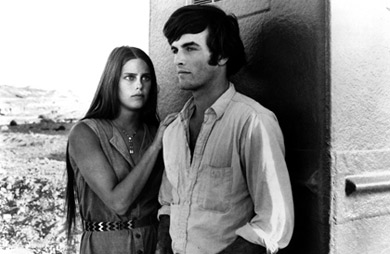The End
 The sixties are over, the revolution failed and technology consumes us as we consume technology.
The sixties are over, the revolution failed and technology consumes us as we consume technology.Ideas belong in a world context. Unfortunately this context is constantly changing and the ideas about identity, sexuality, society, revolution begin to show their age. They are interesting to learn about but can not take on the same meaning out of context. The ways in which these ideas were expressed and the techniques these ideas inspired however can be altered to fit the current context.
Jean-Luc Godard, Werner Herzog and Agnes Varda continue to make films using 1960s aesthetics, aesthetics of aging, story telling, beauty, politics. New film makers are also inspired by the film techniques that emerged from the sixties. Jim Jarmucsh's Stranger than Paradise borrows from Cassavete's Shadows in content and style. The young characters full of existential angst move through an urban landscape and enclose themselves in apartments. Scenes are cut around partial and seemingly meaningless conversations. Like the repetition of the Charlie Parker riffs in Shadows, the music of Screamin' Jay Hawkins frames the action and represents transition.
We have certain expectations when watching films that these aesthetics did not conform to. At times we may struggle with what we are seeing and hearing because it is prompting a different kind of cinema experience from us. It's ok to let our minds wander, we won't miss that important plot twist, our heart does not have to race as the sound track crescendos, we don't even have to like what we see. The stimulation of an unique experience is what the aesthetic is designed to do and thus is expressed in different forms by different directors.

2 Comments:
This comment has been removed by a blog administrator.
This comment has been removed by a blog administrator.
Post a Comment
<< Home